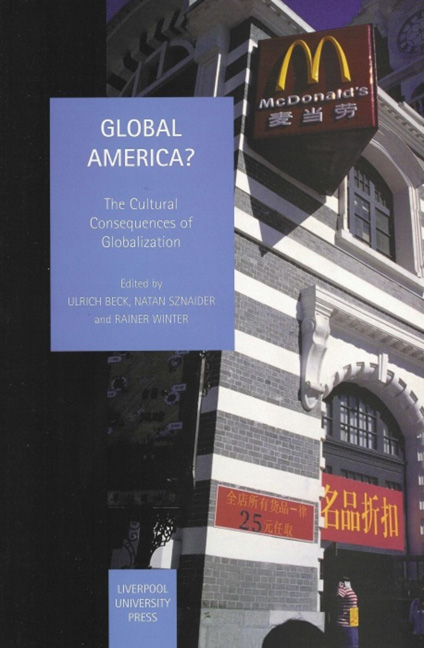Book contents
- Frontmatter
- Contents
- List of Contributors
- Acknowledgments
- Introduction
- PART I THEORETICAL PERSPECTIVES
- PART II NATIONAL CASE STUDIES
- PART III TRANSNATIONAL PROCESSES
- 8 Techno-Migrants in the Network Economy
- 9 The Americanization of Memory: The Case of the Holocaust
- 10 From the Lisbon Disaster to Oprah Winfrey: Suffering as Identity in the Era of Globalization
- 11 Global Media, Cultural Change and the Transformation of the Local: The Contribution of Cultural Studies to a Sociology of Hybrid Formations
- 12 ‘Rockization’: Diversity within Similarity in World Popular Music
- 13 The Internet: An Instrument of Americanization?
- PART IV EPILOGUE
- Rethinking Americanization
10 - From the Lisbon Disaster to Oprah Winfrey: Suffering as Identity in the Era of Globalization
from PART III - TRANSNATIONAL PROCESSES
- Frontmatter
- Contents
- List of Contributors
- Acknowledgments
- Introduction
- PART I THEORETICAL PERSPECTIVES
- PART II NATIONAL CASE STUDIES
- PART III TRANSNATIONAL PROCESSES
- 8 Techno-Migrants in the Network Economy
- 9 The Americanization of Memory: The Case of the Holocaust
- 10 From the Lisbon Disaster to Oprah Winfrey: Suffering as Identity in the Era of Globalization
- 11 Global Media, Cultural Change and the Transformation of the Local: The Contribution of Cultural Studies to a Sociology of Hybrid Formations
- 12 ‘Rockization’: Diversity within Similarity in World Popular Music
- 13 The Internet: An Instrument of Americanization?
- PART IV EPILOGUE
- Rethinking Americanization
Summary
On 1 November 1755, an earthquake shook the city of Lisbon. The news of the disaster quickly reached the French philosophes and sparked one of the most famous philosophical and theological controversies of French intellectual history. As tens of thousands of people had perished in the disaster, philosophers frantically debated on the role of Providence in human affairs. Voltaire, who responded to the disaster most swiftly, wrote in his Poème sur le Désastre de Lisbonne:
Misled philosophers who shout ‘all is well’, come here, run and contemplate these horrible ruins, the wrecks, these carcasses, the pitiful ashes, the women, the children piled on each other under the broken marble, dismembered, one hundred thousand unfortunate people devoured by the earth, people covered with blood, torn apart, and yet still throbbing with life, buried under their own roof, they die without any help, in horror and agony. (Voltaire 1949, my translation)
Voltaire further drives his point and clarifies what is philosophically unacceptable in the event: ‘which crime, which mistake have these children committed, crushed on their mother's breast in their own blood? Was Lisbon, which is no more, more corrupt than London or Paris full of delights? What? Lisbon is destroyed and we dance in Paris?’
Let me make a few preliminary observations. To the best of my knowledge, Voltaire's intervention marks the first time that a philosopher directly addresses his community of fellow philosophers and the general public about a contemporary but distant disaster, and the first time that a philosopher does this by questioning the role of Providence in human affairs. Voltaire's bold conceptual move consists in refusing to view suffering either as the punishment for a hidden sin or as the incomprehensible but just decree of an unfathomable God (Neiman, 2002; Baczko 1997). Voltaire claims that suffering ought to be submitted to the realm of human intelligibility and reason and that as such we can and ought to apply ordinary criteria of justice to suffering, wherever it takes place. In so doing, Voltaire breaks not only with traditional religious theodicy, but also with the eighteenth-century literary cult of suffering which had made tears synonymous with virtue and the spectacle of heroines’ misery into a sweet sentiment supposed to elicit gentle compassion (see Boltanski 1999).
- Type
- Chapter
- Information
- Global America?The Cultural Consequences of Globalization, pp. 189 - 205Publisher: Liverpool University PressPrint publication year: 2003



